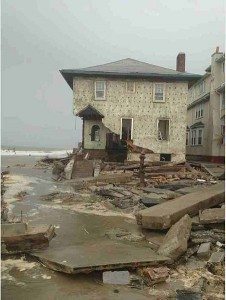Labor & Economy
Hurricane Sandy: The Price of Deregulation

This week marks the first anniversary of Hurricane Sandy, which one year ago tore a path of destruction through much of New York and New Jersey. While media coverage will no doubt focus on the images of nature wreaking havoc on the Eastern Seaboard, we would do well to look at the very human failings that contributed to the damage and suffering inflicted by Sandy.
A good place to start is the practices of companies like ConEdison, the utility giant responsible for electrical and gas service for much of the region. Like other utilities across the country, ConEdison has made significant cuts to its staff over the past several years, while using outside contractors to fill the gaps. In normal times, these cuts lead to unnecessary service delays and interruptions that inconvenience consumers. In a time of crisis, however, understaffing has much more serious consequences.
The overall impact of Sandy was staggering. Millions of people lost electrical service, and many spent weeks without power. The storm was one of the most costly in U.S. history, with $65 billion in damage, and also one of the deadliest, claiming the lives of 160 people.
While much of the damage and power interruptions were inevitable, critics have charged that the situation was aggravated by the fact that ConEdison’s systems were in a weakened state prior to Sandy. This was due in large part to staff cuts that have made it impossible for the utility to perform essential preventive maintenance work.
These assertions were borne out by a state investigation earlier this year, which found that “Con Edison’s preparation for and response to flooding was inadequate, and prolonged the duration that customers were out of power.” The Moreland Commission report stated that “Con Edison was not prepared with either the manpower or the resources necessary to address the issues that arose from the significant flooding.” The commission found similar shortcomings in other utilities in the region.
Evidence from across the country shows that the practices of ConEdison are far from unique. Take Michigan, for example, where staffing in some areas has been reduced by as much as 50 percent compared to the 1970s and 1980s, even as customer demands have increased. Rather than hiring more full-time staff, Michigan utilities have increasingly relied on contractors, who are not subject to the same oversight and standards as utility workers.
The same pattern has occurred in Ohio, according to the Utility Workers Union of America’s Frank Meznarich, who says that utility deregulation has led to the hollowing of the workforce, resulting in longer and more frequent power outages. Similar practices have occurred in California, states UWUA’s Jerry Acosta, noting that Southern California Edison has reduced staff and raised rates while customer service has lagged.
Even as utilities cut staff, many are rewarding their top executives with exorbitant salaries and bonuses. The most egregious example is ConEdison, which gave top executives hundreds of thousands of dollars in the wake of Sandy and subsequent storms. The utility’s chairman and CEO, Kevin Burke, received a $315,000 bonus, bringing his total annual compensation to nearly $15 million. It took a direct request from New York Governor Andrew Cuomo to force Burke to return the money and for ConEdison to put a stop to other bonuses.
America’s supposedly cash-strapped utilities also seem to have plenty of money to spend on things that bring little or no benefit to consumers. A case in point is Ohio’s First Energy, which has doled out millions of dollars for the naming rights to the Cleveland Browns’ stadium even as staff have been cut and services reduced. In California, SoCal Edison has invested a billion dollars in controversial “smart meters,” a decision vigorously opposed by consumer groups because of resulting rate hikes and staff layoffs.
Individual consumers are not the only ones who suffer the consequences of utility understaffing and under-preparedness. Businesses are also directly affected. Indeed, inadequate utility service can have a profound impact on economic growth, undercutting the ability of regions to attract investment and create jobs.
Though the problems facing America’s utilities are vast and complex, the common denominator is deregulation. As states, counties and cities have relaxed standards for utilities, many of the largest energy providers have taken advantage. In the absence of strict regulation, these companies have adopted business models that shortchange consumers, put tremendous strain on workers and in some cases cause substantial harm to communities.
The anniversary of Hurricane Sandy offers us an opportunity to start fixing the country’s utility crisis. This will only happen, however, if Americans demands accountability from the large companies that too often are putting their own profits before the public good.
(Julie Gutman Dickinson is partner in the union-side law firm Bush, Gottlieb, Singer, Lopez, Kohanski, Adelstein & Dickinson. She serves on the Advisory Board of the Los Angeles Alliance for a New Economy. Her post first appeared on Huffington Post and is republished with permission.)

-

 Column - State of InequalityJanuary 29, 2026
Column - State of InequalityJanuary 29, 2026Are California’s Billionaires Crying Wolf?
-

 Latest NewsFebruary 3, 2026
Latest NewsFebruary 3, 2026Amid the Violent Minnesota Raids, ICE Arrests Over 100 Refugees, Ships Many to Texas
-

 Dirty MoneyJanuary 30, 2026
Dirty MoneyJanuary 30, 2026Amid Climate Crisis, Insurers’ Increased Use of AI Raises Concern For Policyholders
-

 Featured VideoFebruary 4, 2026
Featured VideoFebruary 4, 2026Protesters Turn to Economic Disruption to Fight ICE
-

 The SlickFebruary 2, 2026
The SlickFebruary 2, 2026Colorado May Ask Big Oil to Leave Millions of Dollars in the Ground
-

 Column - State of InequalityFebruary 5, 2026
Column - State of InequalityFebruary 5, 2026Lawsuits Push Back on Trump’s Attack on Child Care
-

 Column - California UncoveredFebruary 6, 2026
Column - California UncoveredFebruary 6, 2026What It’s Like On the Front Line as Health Care Cuts Start to Hit
-

 The SlickFebruary 10, 2026
The SlickFebruary 10, 2026New Mexico Again Debates Greenhouse Gas Reductions as Snow Melts

